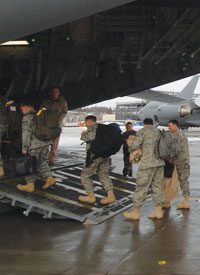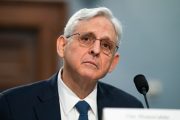
Proponents of universal national service claim that it will bring this nation together and teach younger generations about what it means to be an American. Sadly, many Americans seem to believe those claims. Even with information that the program will be virtually mandatory and might lead to a new version of the draft, some Americans might shrug their shoulders and say "so what?" Well, there is much more wrong with national service than is immediately apparent.
Nineteenth-century French economist and statesman Frederic Bastiat famously wrote in his essay "What Is Seen and What Is Not Seen" that "a law produces not only one effect, but a series of effects. Of these effects, the first alone is immediate; it appears simultaneously with its cause; it is seen. The other effects emerge only subsequently; they are not seen; we are fortunate if we foresee them." What other effects could there be to this universal national service?
Another Big-government Program
National service is just another costly and wasteful big-government program. Like most federal government programs, it will be top-heavy, slow-reacting, expensive, ineffective, and administered from D.C. To get a good idea of what these new "corps" will be doing, one only has to review what AmeriCorps has been up to since its inception. Author James Bovard has documented the almost comical "volunteerism" that AmeriCorps has produced:
In most areas of AmeriCorps activity, its effect is negligible — at best: … An AmeriCorps member helped organize a "Pink Prom," the first gay youth dance in Snohomish County, Washington. AmeriCorps members in Worcester, Massachusetts, presented lessons in half a dozen schools about "Super Bowl Surge" — the problems that occur when millions of people watching the big game use the bathroom during half-time…. Puppet shows are a favorite activity for AmeriCorps members. In Springfield, Illinois, AmeriCorps members presented a puppet show to edify three-year-olds at the Little Angels Child Care Center by alerting them to the benefits of smoke detectors.
Bovard also explains that AmeriCorps is grossly mismanaged and has yet to produce any serious, tangible results.
Though AmeriCorps abounds in"’feel good" projects, it has never provided credible evidence of benefit to the United States. The Office of Management and Budget concluded in 2003 that "AmeriCorps has not been able to demonstrate results. Its current focus is on the amount of time a person serves, as opposed to the impact on the community or participants." OMB noted in 2004, "AmeriCorps accomplishments are difficult to measure, but its reported impact is small." The General Accounting Office noted in 2000 that AmeriCorps "generally reports the results of its programs and activities by quantifying the amount of services AmeriCorps participants perform." GAO criticized AmeriCorps for failing to make any effort to measure the actual effect of its members’ actions.
More Taxes and Inflation
What will happen when taxes are raised to pay for this increased spending? The money will have to come from somewhere. It will either be raised by taxes or created by the Federal Reserve, thereby inflating the money supply. Either way, the American people will bear the brunt of the cost. How will this increased spending impact present levels of volunteerism and charitable giving? There is the real threat of crowding out private sector charity by having the federal government take such a large leap into bureaucratizing community service. Jim Grichar, a former economist for the federal government, wrote that "real volunteerism in this country still exists, and if taxpayers were not being mulcted for every goofy and evil social welfare scheme, they would have the time and resources to devote to increased genuine charitable efforts." Grichar, having witnessed AmeriCorps firsthand, also wrote that "the real horror is always the same — you as a taxpayer pay more and get less than you would have if the private sector — either for-profit businesses or non-government-funded private charities — handled the problem. The inefficiency, waste, fraud, other corruption and abuse inflicted on taxpayers by the federal government — like all governments it has a territorial monopoly of power and the authority to tax citizens to pay for its activities — appears endless, a price we have to pay for progress."
Destroying Private Charity
Research has shown that believers in big government do not put much stock in private charity. Syracuse University Professor Arthur Brooks, author of Who Really Cares, did research to see who gives more to charity between liberals and conservatives. "When you look at the data, it turns out the conservatives give about 30 percent more. And incidentally, conservative-headed families make slightly less money…. You find that people who believe it’s the government’s job to make incomes more equal, are far less likely to give their money away." (Emphasis added.) If those trends continue, this huge national-service initiative could have a similar effect. People who volunteer through government programs will forgo volunteering through private organizations. As more people believe that charity is the responsibility of government, private charity and willful volunteerism will decline.
In addition, by mandating volunteerism at such an early age, universal national service might have the effect of discouraging future community service. According to a research article published in the journal of the American Psychological Society, "Students who are not willing or not ready to volunteer — but who are required to by their school — may be less likely to volunteer again in the future."
The reality is that present government policies are obstacles to private volunteerism. Former special assistant to the Reagan administration Doug Bandow, in testimony to Congress on national-service programs, said that while much "worthwhile service work remains to be done across the country … government often stands in the way of private individuals and groups who want to help. Such barriers should be stripped away, yet [federal national-service programs] may divert attention from the ways the government hinders private provision of important social services…. Restrictions on paratransit operations limit private transportation for the disabled. Regulations also harm other forms of volunteerism. Health regulations prevent restaurants in Los Angeles and elsewhere from donating food to the hungry, for instance. In short, in many cases important needs are unmet precisely because of perverse government policy."
There is another danger posed by bureaucratizing roles typically run by private churches. Obama has vowed to continue George W. Bush’s faith-based initiatives, but he wants to put his own mark on it: "Make no mistake, as someone who used to teach constitutional law, I believe deeply in the separation of church and state, but I don’t believe this partnership will endanger that idea — so long as we follow a few basic principles…. First, if you get a federal grant, you can’t use that grant money to proselytize to the people you help and you can’t discriminate against them — or against the people you hire — on the basis of their religion. Second, federal dollars that go directly to churches, temples, and mosques can only be used on secular programs. And we’ll also ensure that taxpayer dollars only go to those programs that actually work."
Basically, this is more of the "strings attached" federal funding approach. Obama will be all too willing to throw federal funds around for national-service programs, even ones that are involved with religious charities, but participating religious charities will have to abide by the rules of the secular state. One can only imagine what will happen to volunteer work for such controversial issues as abortion or sex education. If a church doesn’t follow Washington’s direction in controversial areas, they run the risk of being left behind in the national-service tidal wave of state-controlled "volunteers."
Indoctrination
Federally funded and directed programs would be a great way for establishment leaders to control the debate on the issues. Since the 1950s, the federal government has become more and more involved in education. During this time, education policy has become more propagandized and directed from Washington. Jacob Hornberger, president of The Future of Freedom Foundation, writes that "public schooling has achieved success in one important area: the creation of a flock of good little citizens who believe that the paternalistic welfare state constitutes freedom and free enterprise. Indeed, herein lies the power of public schooling — the power of government employees to indoctrinate children, year after year, with their officially approved version of what it means to be free." Could national-service programs be another method employed by the government to "indoctrinate" our nation’s youth? The possibility is certainly there.
The "Classroom Corps" could assist with teaching children the accepted progressive notions of the day. The "Health Corps" would immediately put to work a new coalition clamoring for socialized medicine and further government intervention into healthcare. The "Clean Energy Corps" could spread the message of a "necessary" global solution to the dire threat of "climate change" most likely administered through the UN. Finally, the "Homeland Security Corps" could help train a generation of citizens on how to implement the directives of the federal government at a moment’s notice. What starts out as voluntary soon becomes mandatory. This initiative would also assist with the continued centralization of power in Washington. In every way, national service would only serve to tie our nation’s youth more closely to government and indoctrinate them in the mindless worship of the all-powerful State as the solution to all of life’s problems. This new "service" generation would be more willing to accept big-government solutions at both the national and global level.
Un-American and Unconstitutional
The whole notion of universal national service runs counter to the founding principles of our nation. Alex Epstein, writing in the online Capitalism Magazine, explains that "America was founded on the principle of individualism: the idea that each individual is a sovereign being with the moral right to his own life and to the achievement of his own goals. This is the basis of the political idea, enshrined in our Declaration of Independence, that the individual possesses inalienable rights to life, liberty, and the pursuit of happiness. The Founders accordingly reconceived the purpose of government as being the servant of the individual, rather than his master…. This collectivist belief in the supremacy of the group over the individual is the foundation of the national-service ideology, which regards the individual as a servant to the nation. The notion that people are ‘nothing without the group’ and owe their lives — or any portion of them — to the state is antithetical to American individualism and freedom."
Volunteerism as it exists in a free society has virtually nothing in common with the vision of national service promoted by Obama. Sheldon Richman, editor of The Freeman, explains that "if people wish to perform service for others, they of course should be free to do so, with their own time and money. They should neither be forced nor use force in the name of service. A legally enforceable obligation to perform service clashes with the principles of the free society and proclaims that individuals are not self-owners but rather the property of society or the state. If there is no right to live for one’s own sake, there are no rights at all." Richman also asks, "Where do people get the idea that the Nation is something to be served?… This is a profoundly un-American concept. It’s far more consistent with the European despotism of the first half of the twentieth century. You don’t have to look hard to find quotations by Mussolini (dare I mention Hitler?) about the duty of the individual to serve the Nation…. This is not what most Americans thought at the time of the founding."
The first thing that comes to a constitutionalist’s mind after contemplating Obama’s proposal is that there is no authorization for it in the Constitution. It appears that Obama hopes to do an end-run around the Constitution by employing the liberally interpreted "General Welfare" clause that is used to justify the taxing and spending powers of Congress. Even with this dubious rationale, the question remains whether universal national service violates the 13th Amendment’s prohibition on "involuntary servitude." Ilya Somin, a law professor at George Mason University, certainly thinks so. "I think that the answer is pretty clearly ‘yes,’ at least if you take the text of the Constitution seriously…. Note that the Amendment forbids not only ‘slavery’ but also ‘involuntary servitude,’ a provision deliberately inserted to prevent state governments from, in effect, reenslaving blacks by imposing ‘temporary’ forced labor systems. Mandatory national service, which would require young people to do government-mandated work … is pretty clearly involuntary servitude under any reasonable definition of the word."
The truth of the matter is that any program of universal national service is unconstitutional and un-American. Congressman Ron Paul (R-Texas) put it best when he said, "Some politicians simply love the thought of mandatory service to the federal government…. Both sides share the same belief that citizens should serve the needs of the state — a belief our founders clearly rejected in the Declaration of Independence. To many politicians, the American government is America…. Compulsory national service, whether in the form of military conscription or make-work programs like AmeriCorps, still sells on Capitol Hill. Conscription is wrongly associated with patriotism, when really it represents collectivism and involuntary servitude."
For more information, see "Any Volunteers for National Service?"
Photo: AP Images



